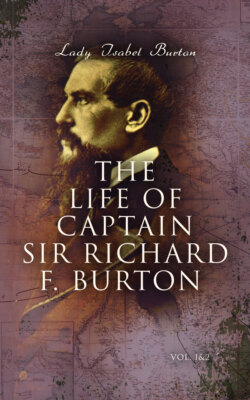Читать книгу The Life of Captain Sir Richard F. Burton (Vol. 1&2) - Lady Isabel Burton - Страница 37
На сайте Литреса книга снята с продажи.
BETWEEN THE CRIMEA AND THE LAKE REGIONS OF CENTRAL AFRICA.
Оглавление"Aye free, aff-hand your story tell,
When wi' a bosom crony;
But still keep something to yoursel'
Ye scarcely tell to ony."
——Burns.
As soon as Richard was well home from the Crimea, and had attended Beatson's trial, he began to turn his attention to the "Unveiling of Isis," in other words, "Discovering the sources of the Nile, the Lake Regions of Central Africa," on which his heart had long been set, and he passed most of his time in London working it up.
One summer day, in August, 1856, thirty-seven years ago, we had not gone out of town, and I was walking in the Botanical Gardens with my sister, Blanche Pigott, and a friend, and Richard was there, walking with the gorgeous creature of Boulogne—then married. We immediately stopped and shook hands, and asked each other a thousand questions of the four intervening years, and all the old Boulogne memories and feelings which had lain dormant, but not extinct, returned to me. He asked me before I left if I came very often to the Botanical Gardens, and I said, "Oh yes, we always come and read and study here from eleven to one, because it is so much nicer than staying in the hot rooms at this season."' "That is quite right," he said. "What are you studying?" I had that day with me an old friend, Disraeli's "Tancred," the book of my heart and tastes, which he explained to me. We were there about an hour, and when I had to leave, as I moved off, I heard him say to his companion, "Do you know that your cousin has grown charming? I would not have believed that the little schoolgirl of Boulogne would have become such a sweet girl;" and I heard her say, "Ugh!" with a tone of disgust.
Next day, when we got there, he was also there—alone—composing poetry to show to Monckton-Milnes on some pet subject, and he came forward, saying laughingly, "You won't chalk up 'Mother will be angry' now, will you, as you did when you were a little girl?" Again we walked and talked. This went on for a fortnight—I trod on air.
We become engaged.
At the end of a fortnight he asked me "if I could dream of doing anything so sickly as to give up Civilization, and if he could obtain the Consulate at Damascus, to go and live there." He said, "Don't give me an answer now, because it will mean a very serious step for you—no less than giving up your people, and all that you are used to, and living the sort of life that Lady Hester Stanhope led. I see the capabilities in you, but you must think it over." I was so long silent from emotion—it was just as if the moon had tumbled down and said, "I thought you cried for me, so I came"—that he thought I was thinking worldly thoughts, and said, "Forgive me! I ought not to have asked so much." At last I found my voice, and said, "I don't want to 'think it over'—I have been 'thinking it over' for six years, ever since I first saw you at Boulogne on the Ramparts. I have prayed for you every day, morning and night. I have followed all your career minutely. I have read every word you ever wrote, and I would rather have a crust and a tent with you than be Queen of all the world. And so I say now, Yes! Yes! YES!" I will pass over the next few minutes. Then he said, "Your people will not give you to me." I answered, "I know that, but I belong to myself—I give myself away." "That is all right," he answered; "be firm, and so shall I."
After that he came and visited a little at our house as an acquaintance, having been introduced at Boulogne, and he fascinated, amused, and pleasantly shocked my mother, but completely magnetized my father and all my brothers and sisters. My father used to say, "I don't know what it is about that man, but I can't get him out of my head, I dream about him every night."
Cardinal Wiseman and Richard had become friends in early days. Languages had brought them together, and the Cardinal now furnished him with a special passport, recommending him to all the Catholic Missions in wild places all over the World, with special letters describing him as a Catholic Officer.
The Story of Hagar Burton.
I now think I must introduce to you two cuttings from the Journal of the Gypsy Lore Society. The first was an obituary after his death, January, 1891; the other was a small contribution from me, throwing a light on his Gypsy interests, and this will explain better than any other way why I was so impressed on hearing his name when we were introduced, and why I was so startled at his pursuit and mingling with the Jats, the aboriginal Gypsies in India, mentioned in my Boulogne recital.
